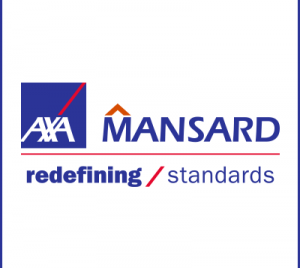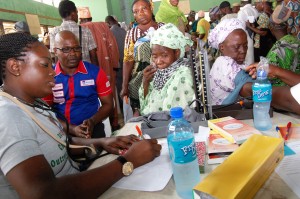AXA MANSARD SPONSORS WEST AFRICAN COLLEGE OF SURGEONS’ (WACS) COMMUNITY OUTREACH PROGRAM
In furtherance of its commitment towards the provision of quality healthcare to Nigerians of diverse socio-economic backgrounds, AXA Mansard co-sponsored the Ibadan Community Outreach Program, organized by the West African College of Surgeons (WACS).
The program was a 4-day community outreach organized by the West African College of Surgeons (WACS) and the Oyo State Government at the General Hospital, Aremo, Ibadan from Monday, November 23 to Thursday November 26. The College of Medicine, University of Ibadan, the University College Hospital, Ibadan and the Association of General and Private Medical Practitioners of Nigeria (Oyo State) actively participated in the program, which comprised health education talks, health screening and provision of intermediate surgical procedures.
Free medical services were provided for over 1700 cases, including general health checks and screening, urological diseases, obstetrics and gynecology diseases, primary dental and ophthalmological care as well as provision of eye glasses amongst others.
Mr. Tope Adeniyi, the Chief Executive Officer of AXA Mansard Health Limited commented that this initiative is part of AXA Mansard’s contribution towards improved health care delivery to Nigerians.
Professor Olapade Olaopa, Chairman of the Local Organising Committee, representing the Chairman, West African College of Surgeons Outreach Program, thanked AXA Mansard on behalf of the President and Council of the WACS for the continuous support towards the actualization of the goal of the committee which is to improve the overall health of members of the public and lead everyone to a better and healthier life.
Establish Expertise Inside Your Company
In a competitive marketplace, developing a reputation as an expert is one of the best forms of career insurance. Having a blue-chip personal brand is powerful for international thought leaders, who can leverage it to command exorbitant speaking fees. But it’s also helpful for professionals who work inside corporations, where a great reputation can bring coveted promotions and opportunities. Here’s how you can become recognized for your expertise inside your company.
First of all, it’s important to recognize that you don’t have to start out as a worldwide expert. Too many people discount their value. You can coach others on writing better business memos even if you’re not Shakespeare, or lead an office running group even if you’re not Usain Bolt.
Michael Leckie was a vice president of human resources for a prominent research company when he developed an interest in coaching. Although the subject was related to his job, it wasn’t part of his actual responsibilities—he simply began studying it because he wanted to. He started out as a novice, compared to worldwide authorities, but he quickly grew to be one of the most knowledgeable people about talent development within his company. “When you start building your brand in a corporation, it’s a confined space,” he told me in an interview for my new book, Stand Out. “You don’t need to be the best in the world; you just need to be the best one there. You can be a big fish in a little pond, and if you’re the biggest fish in that environment, you get bigger and can then start to do things outside the organization.”
In these early stages, it’s important to be clear about what you know and what you don’t. If you try to prematurely position yourself as an expert who can compete with industry giants, you risk losing credibility when you’re faced with a question or challenge you’re unsure about. But if you’re honest about where you are in the process – experienced with some facets and still learning others – then others are likely to respect you for your superior knowledge and not hold it against you if you don’t know everything.
As your profile grows, it’s also important to ensure that your company understands the value of your public brand. This is especially important if, like Leckie, you’re cultivating expertise on a subject that isn’t part of your core responsibilities. “My world is [the firm], so I need to have my brand aligned to what matters to them,” says Leckie. Developing his coaching brand began to raise Leckie’s professional profile in general, which eventually to led to an invitation to give a keynote talk for a client’s conference of technology leaders. The keynote was an exciting opportunity for him, but his superiors could have viewed it with suspicion (Why is he getting all this attention? Why isn’t he concentrating on his real job?) if he hadn’t taken the time to show them how it was relevant to the company’s business objectives.
“With outside things, you have to make sure you’re explaining them [in terms of] what matters in the organization,” said Leckie. “Otherwise, they start to look, to some, like a distraction.” He didn’t assume his boss’s boss would understand why it was important for him to speak at the conference – rather, Leckie explicitly articulated the keynote’s business benefits to him. “What he’ll be excited about is great interactions with the client,” Leckie said, “and that I’m out there developing business and increasing the relationship they have with us.”
Finally, it’s important to recognize when it’s time to expand what you’re known for strategically. “Sometimes your brand is more happenstance than thoughtful,” says Leckie. “It may be about things you like, but it’s not necessarily leading you where you want to be moving toward.” Leckie realized he’d been so successful at building his expert reputation around coaching and talent development that those skills — even though they were valuable for an HR leader — were beginning to overshadow others that were deemed more critical inside his company. “My brand got established and it opened the door, but it also began to shut other doors. It became clear to me that while I was really good at building and driving a team that got great business results, when people were talking about me, it wasn’t about business results; it was about the more unique elements of my brand [such as coaching].”
That’s why he decided to make coaching a “sub-brand.” In other words, he didn’t abandon it, but he started emphasizing it less in favor of talking about his ability to drive the bottom line. “It’s giving people a language of how to think about you subtly,” he says, by shifting the topics you discuss and by enlisting friendly ambassadors to highlight your relevant accomplishments. That’s been especially important to him as he’s risen in the ranks of his company and now holds a broader leadership role.
It’s slightly trickier for professionals to build a strong personal brand inside a company, as compared to entrepreneurs or other free agents. You have to balance the unique mix of your skills and interests with your company’s needs and sensibilities. But when done right, cultivating a brand as a “local expert” inside your company can enhance your professional reputation and ensure you’re valued the way you should be.
- Published in Blog, Uncategorized
AXA Mansard rated among Top 50 Brands in Nigeria
AXA Mansard Insurance continues to receive top ratings amongst other brands. AXA Mansard Insurance was rated among the Top 50 Brands in Nigeria by APT Brand International Limited.
Top 50 Brands in Nigeria is an annual selection of top brands in Nigeria. The award criteria include leadership structure, market acceptance, brand equity, product offerings, culture, quality service delivery and market performance.
The record is indeed significant for AXA Mansard Insurance as it is the only insurance company to receive this outstanding recognition along with other highly rated brands in the country.
The Chief Client Officer, Tosin Runsewe commented that “Our brand has grown over time and has become a symbol of our desire to keep evolving new ways of pleasing our customers. The value of our brand represents the value we place on our customers and serves as a hallmark of our brand promise to them to protect their assets, health and loved ones”.
Adding to this, the Group Head Strategy and Marketing, Kola Oni, says “We are delighted to receive this award for the second year in a row. The AXA Mansard brand is unique and this award is dedicated to our customers who have supported us over time even as they recognize and appreciate the AXA Mansard experience”.
Investing In Real Estate
Real estate is one of the world’s oldest investment activities. Humans have always required shelter, from the days of living in caves to the modern day real estate era of duplexes and sky scrapers. Real estate investing involves the purchase, ownership, management, rental and/or sale of real estate for profit. It has proven quite a profitable investment outlet for many investors, particularly over the medium to long term. However, contrary to the popular ‘safe as houses’ phrase, there are risks. It is important to note that real estate is an asset class with limited liquidity relative to other investment asset classes. Real estate is also capital intensive and highly cash flow dependent. If these three risk areas are not well managed, it is possible for an investor to fall into negative cash flow, and if this persists, the investor may be forced to sell the property at a loss or even go into insolvency. This is probably one of the primary causes of investment failure.

Investors profit from real estate in at least four different ways. Real estate appreciation occurs when the property becomes more valuable than when it was purchased due to a change in the real estate market, greater demand for the property, the land around the property becoming scarcer or busier or upgrades are put into your real estate investment to make it more attractive to potential buyers or leasing parties. Cash flow income arises from the rental streams that emanate from property such as an apartment building, office blocks, rental houses, etc. Real estate-related income is that generated by ‘specialists’ in the real estate industry such as real estate brokers, who make money through commissions from buying and selling property, or real estate management companies, who get to keep a percentage of rents in exchange for running the day-to-day operations of a property. Ancillary real estate income refers to that arising from mini-businesses within a bigger real estate investment that allows the investor to make money from a semi-captive collection of customers. A good example of this is vending machines within an office development.
There are different categories of real estate investment. Residential real estate investments are houses, town houses, apartment buildings, housing estates and vacation homes where an investor can expect rental income as well as exposure capital appreciation. Commercial real estate investments consist mostly of office buildings. This is quite an interesting area for investors as rental income from this type of investment is typically governed by long leases and offers a steady income. However, commercial real estate is often highly capital intensive. Industrial real estate consists of warehouses, petrol stations, factory-office multi-use property, factory–warehouse multi-use property, heavy manufacturing buildings, industrial parks, light manufacturing buildings and research and development parks. Retail real estate investments consist of shopping malls, strip malls and other retail storefronts. These are becoming ever more popular in Nigeria as the middle class expands and they offer investors attractive investment yields. Real Estate Investment Trusts, or REITs, trade like stocks and own a portfolio of underlying real estate or real estate mortgages. They work like a mutual fund, whereby the issuer of the REIT is a professional real estate investment company. They pool funds together from different investors and issue units in exchange. The funds are then used to create a property portfolio, which could consist of both residential and commercial property. A REIT must pay out 90% of its profits to investors to remain a trust.
As with any other investment decision, there are always key things to consider and look out for. They may make the difference between making and losing money. It is not an exhaustive list, but some of the key things are listed below:
(a) Location: This remains one of the foremost success factors in siting a real estate development. Certain locations have a better ability to ensure that real estate developments continue to attract patronage all through the business cycle and result in a greater ability to generate returns from the investment made. The location of a property investment is, of course, highly dependent upon the end use to which the property investment is to be deployed. The investment profile of a property located in a well-established location will be quite different from the same property in a run-down area.
(b) Infrastructural Development: Knowledge of new projects coming up in a neighbourhood such as access roads, a shopping mall or a rail line can significantly improve the value of the property. New roads and rail lines mean improved access to a certain area, thereby making the area more attractive to prospective tenants and investors. It can, however, also reduce the value of the property if, for instance, the new rail line runs close to the house, with the noise from the trains constituting a nuisance. The same applies to shopping malls or airports as they will bring with them new jobs and naturally employees looking for accommodation. Imagine the increase in value to an area previously without power supply and a contract is awarded to install and connect power lines to that area.
(c) Inflation Outlook: Inflation affects the value of money and investments. For an investment to give real returns it has to be above inflation. So a property returning 5% per annum in an economy where inflation is 10% cannot be said to be really profitable.
(d) Interest Rates: Most real estate investments are financed with debt. This occurs especially when leveraging occurs. In leveraging you pay for a property by contributing an amount as capital and funding the rest by a mortgage loan. In the event that interest rates rise, it means that your cost of funding will rise, thereby reducing your profit margin. It also makes it harder to sell the property as the potential buyer has to consider the elevated interest rate that he has to pay, thereby making the purchase less attractive. It might lead to the potential buyer asking for a discount to cover elevated interest rates.
(e) Population Growth: Growth in population means an increased need for housing. Not just for housing but also for service providers for the growing population. These service providers (bank branches, new stores etc.…) would have to acquire or rent property to operate from. So, population growth is an important factor in real estate investment. Also, migration to a particular area by the population would be another factor. In Lagos, Nigeria, the growing middle class seems to prefer living in the Lekki area, which has led to an increase in house prices and rent and also to the proliferation of shopping malls and supermarkets.
(f) Projected Economic Growth/Wellbeing: A growing economy with a growing middle and upper class means more demand for everything, from clothing to food and to property. A growing economy also means more investible income, with people looking to buy their first house or for other real estate investments. To put it in perspective, an economy in recession means job losses or cost cutting by firms. This means fewer people with investible income to acquire real estate. It also means that people who have lost their jobs will start to default on their mortgage or rent payments. This will eventually lead to forced sales of property, bearing in mind that forced sales are normally at a discount. The final outcome will be decline in real estate value.
(g) Government Policies: Policy shifts may affect the real estate market. It could be in terms of increased or reduced taxes or an effect of capital gains on property investments. The recent change in capital gains tax by the Chinese authorities led to a scramble by investors to sell off their property holdings to avoid paying the 20% capital gains tax. Other policies such as increase in lending rate for second or third home buyers also can affect the market.
Nigeria is a country of over 160 million people with a housing deficit of over 16 million housing units. Ordinarily, this would constitute a huge opportunity for investors as demand clearly outstrips supply. However, we have not seen this gap being met due to the high cost of real estate in Nigeria and the inability of the masses needing property to afford it. Urban migration has led to demand for housing units in cities such as Ibadan, Port Harcourt, Warri, Enugu, Benin, Lagos and Abuja, with the housing deficit still unmet. Factors such as the high cost of land, elevated interest and mortgage rates, and poor infrastructure continue to adversely impact upon the availability of affordable, quality housing stock within the country.
For portfolio investors, analysis has repeatedly shown that real estate enhances diversification and acts as an inflation hedge. A low correlation to both stock and bond returns suggests that real estate investments have the potential to lower overall portfolio risk while the ability to increase rental rates in times of high inflation affords the opportunity to maintain the real value of a portfolio. Real estate should therefore be a constituent of most investors’ portfolios. Whilst this may be difficult for the average investor to achieve on account of a relatively high investment outlay, professional investment managers are well positioned to package that exposure to investors through mutual funds and real estate investment trusts.
Allow us to tell you a short story…
Allow us to tell you a short story….
Mr. and Mrs. John Lagbaja built a modest 4 bedroom duplex in Ilupeju, Lagos. It took them six years and a great deal of sacrifice following the graduation of their youngest child from the university. Years of saving and investment paid off as they were finally able to move into their own home. It was a dream come true as excited friends and well-wishers attended the formal “house-warming” party. Prayers were offered by their parish priest and the small crowd assented to his prayers with cries of “Amen!”
Their first child who lived in the US sent them some money to furnish the new house as only new furniture and fittings would do. Mr. Lagbaja had prudently used the money to furnish and equip their new home with electronics, furniture, fittings, some security gadgets etc. only relinquishing control to his wife when it came to furnishing the kitchen! The Lagbajas were now landlords in Lagos.
7 months later on a warm February night, Mr. John Lagbaja who was the lighter sleeper woke up to sounds of faint shouting. He looked at his watch and it was 3am in the morning. What was going on? His phone started to ring. He grabbed it and it was then he detected the smell of smoke. The call was from a neighbour: “Sir! Fire! Fire! Your house is on fire!!” He quickly woke his wife and ran out of the house.
By 5am the fire had been put out through a combined effort of volunteers and the fire-fighting service but the damage caused by the fire was considerable. Two rooms with their toilet and bathrooms were burnt from floor to roof. The ceiling and roof of their bedroom was also affected. Black smoke had darkened the walls and the heat had melted the wiring and other parts. Water from the hoses had left every other thing soaking wet.
The Lagbajas wept and tried to console each other. How would they recover from this?
(Alternate ending)
As Mrs. Lagbaja wept her husband tried to console her, assuring her that everything would be fine. A few days later the Lagbajas received a cheque from AXA Mansard. His prudence had paid off.
The AXA Mansard Home Insurance plan protects you and your home against the risk of fire, flood, burglary etc. It does not matter whether you own a house, live in a rented apartment or you are sharing with friends or family, we offer you and your property and belongings protection from total loss.
For more information, please visit our website at www.axamansard.com, or email us at insurancecare@axamansard.com. You can also call us on 0700 AXA Mansard.
Let’s protect you.
AXA Mansard
4.5 Million Nigerians Suffer from Hypertension
What is Hypertension?
Hypertension or High Blood Pressure is when the long-term force of the blood against your artery walls is high enough that it may eventually cause health problems, such as heart disease.

How do you measure blood pressure?
Blood pressure is determined both by the amount of blood your heart pumps and the amount of resistance to blood flow in your arteries.
What are the symptoms of hypertension?
You can have high blood pressure (hypertension) for years without any symptoms. High blood pressure generally develops over many years, and it affects nearly everyone eventually.
Hypertension amongst Nigerians
The Federal Ministry of Health of Nigeria has revealed that a total of 4.5 million Nigerians are living with hypertension. Even more worrying is the fact that the rate of this disease is rapidly growing, especially in urban areas of the country.
Hypertension has become such an issue in Nigeria that the federal government and Neimeth Pharmaceutical International have pledged to reduce the high rate of the non-communicable disease.
Federal Ministry of Health’s Permanent Secretary, Mr. Linus Awute, said: “The health sector is inundated with many challenges, hypertension as a non-communicable disease is one of them. We want to use this opportunity to work with Neimeth Pharmaceutical, making it a wonderful intervention.”
The Managing Director of Neimeth Pharmaceutical International, Emmanuel Ekunno assured stakeholders that the company would remain steadfast in supporting efforts to fight hypertension.
Common diseases such as hypertension can be treated and controlled, but they need to be diagnosed as early as possible. The treatment needs to be tailored and managed well, healthcare plans remove the risk of financial problems delaying treatment.
- Published in Blog
SUPER SEVEN FC PICKS NIGERIA’S TICKET TO REGIONAL FINAL
Nigeria is to be represented at the regional circuit of the ongoing Standard Chartered Bank’s Road to Anfield five-a-side competition by Super Seven FC.

Mrs Yetunde Oni, Head Commercial Clients, Standard Chartered Bank (3rd left), presenting the Trophy to Captain of Super Seven Football Club, Ojo Babatunde Damilola, the winner of the just concluded Standard Chartered Road to Anfield 2015 competition.
Super Seven bagged the ticket to the regional final in Accra, Ghana after defeating Dobber FC 6-5 in a penalty shoot-out at the Astro Turf ground in Lekki, Lagos. Neither of the two sides could end the scoreless deadlock at regulation time. Also to join Nigeria and host Ghana at the Accra soccer fiesta is The Ghana. The three are to battle for the West African ticket to Anfield in the UK where the winners of the East and Southern African regions will also play.
According to the Sub-Regional Head, Brands & Marketing, West Africa of Standard Chartered Bank, Diran Olojo, the ‘Standard Chartered Trophy’ is an international five-a-side football tournament organised by the bank in partnership with Liverpool FC.
“It offers football fans a once in a life time, money can’t buy, opportunity of playing at an English Premier League football pitch as well as been coached by Liverpool FC’s Manager, Brenda Rodgers,” observed Olojo at the trophy presentation at the weekend.
Standard Chartered’s global footprints will compete for the ultimate trophy on May 7 and 8, 2015. The winners of the ‘Finals’ will be crowned overall champions of the ‘Standard Chartered Trophy 2015’.
Also speaking at the end of the national final last Sunday, Country Head, Corporate Affairs, Standard Chartered Bank, Nigeria, Dayo Aderugbo, expressed her happiness at the level of performance of the players and the huge turnout of football fans.
“I am so excited with the level of performance. We have a huge turnout. 36 teams registered and contested in the championship. So, regardless of the club you support, it’s a chance to come together and win together and go and play in Anfield, the home of Liverpool FC,” she noted with excitement.
Standard Chartered Bank to Launch “Employee Volunteering Month”
Committed to making a positive difference to communities
Lagos, Nigeria – 2015 – Standard Chartered Bank announces that September 21st to October 20th will be ‘Employee Volunteering Month’. With over 8,000 staff in Africa, the Bank encourages its staff to use their interests and skills to help out in the local communities in which it is based to make a real difference.
Many spend time working on causes the bank supports, such as eradicating preventable blindness, support for people living with HIV/AIDS or financial education. Other employees choose to volunteer for a cause close to their own heart, from planting trees, mentoring or training youth on health and hygiene.
Commenting on the launch, Bola Adesola, CEO Standard Chartered Bank Nigeria said: “We believe that volunteering is good for our communities, staff and our business. The Bank offers every employee three (3) days paid leave to volunteer and its great to see staff showing strong commitment and passion to serve the community in which we operate. We look forward to the opportunity of using our skills in making a unique contribution to Nigeria this year”.
Last year, Standard Chartered staff donated over 9,700 employee volunteering days in Africa.
- Published in Blog
AXA MANSARD WINS BEST IN-HOUSE LEGAL TEAM (INSURANCE) IN THE ESQ NIGERIAN LEGAL AWARDS 2015
The Legal Team of AXA Mansard Insurance plc has emerged Best In-House Legal Team in the Insurance category at the ESQ Nigerian Legal Awards 2015, which held at the Muson Centre, Lagos.
The ESQ Nigerian Legal Awards honours outstanding legal professionals in Nigeria and in the diaspora. The Awards rewards contributions in key business transactions, practice areas, strategic growth, excellence and innovation in client service, advancement in technology and support to the growth of the legal profession at large.
Mrs. Omowunmi Adewusi, Company Secretary and Head of Legal thanked the organizers of the ESQ award and stated: “We are indeed elated to be recognized and presented this award. The AXA Mansard culture of integrity, professionalism, team spirit and the continuous desire for excellence are some of the factors that qualified the team for the award.”
The ESQ Nigerian Legal Awards is an annual event and is the brainchild of Lere Fashola, Chief Executive Officer, Legal Blitz Limited and publisher of the ESQ Legal Practice Magazine.
- Published in Blog
AXA MANSARD WINS 2015 NIGERIAN CFO AWARDS
Rashidat Adebisi, the Chief Financial Officer of AXA Mansard won the CFO of the Year in the Insurance category at the 2015 Nigerian CFO Awards held on Friday, October 2, 2015 at Four Points by Sheraton, Lagos.
The Nigerian CFO Awards organized by Instinct Business is in its maiden year in Nigeria. The award recognizes and celebrates the accomplishments of financial executives for their financial leadership and overall contribution to their companies’ growth.
Rashidat Adebisi while receiving the award, dedicated it to the AXA Mansard group and also pointed out that the responsibility of a CFO goes beyond the accounting role and cuts across the various roles within the organization towards achieving the overall objective of the Company. She concluded by saying that AXA Mansard would continue to redefine standards both home and abroad.
Rashidat Adebisi joined AXA Mansard in February 2005 as an Executive Officer in the FINCON Group. She became the Head of the Transaction Service Unit in 2007 and returned to FINCON as Group Head in 2008. She is now AXA Mansard Group’s Chief Financial Officer and Divisional Director, FINCON and Corporate Services.
- Published in Blog


